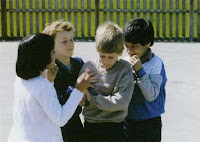"Do children with ASD Level 1 have speech problems, or is this purely an issue in ASD Level 3?"

"Do children with ASD Level 1 have speech or language problems, or is this purely an issue in ASD Level 3?" Although kids with ASD level 1, or High-Functioning Autism (HFA), acquire language skills without significant general delay - and their speech typically lacks significant abnormalities - language acquisition and use is often atypical. Abnormalities include: abrupt transitions auditory perception deficits literal interpretations miscomprehension of nuance oddities in loudness, pitch, intonation, prosody, and rhythm unusually pedantic, formal or idiosyncratic speech use of metaphor meaningful only to the speaker verbosity Three aspects of communication patterns are of clinical interest: marked verbosity poor prosody tangential and circumstantial speech Although inflection and intonation may be less rigid or monotonic than in ASD level 3, young people with HFA often have a limited range of intonation (e.g., speech may be unusually fast, jerky or






